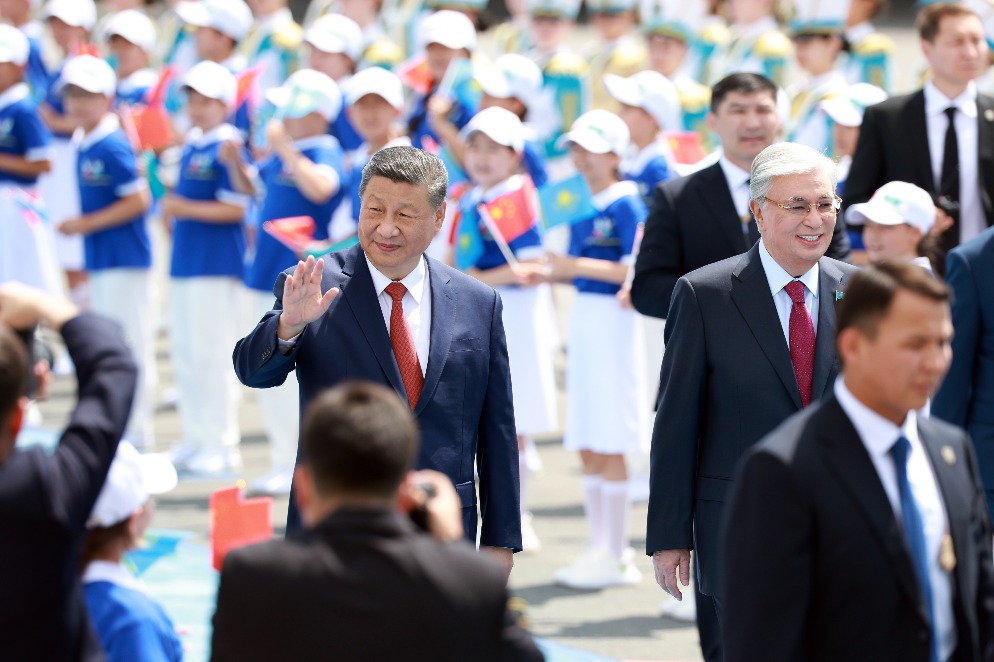Reality is different


China is not an exploitative power; the opposite is true, says scholar
The governor of the Central Bank of Nigeria recently published an article in Britain's Financial Times, in which he claims that China takes Africa's primary commodities and sells Africa manufactured goods, which is the essence of colonialism.
He also says China uses equipment and labor imported from home, without transferring skills to local communities. He further warns China is capable of the same forms of exploitation as the West, and is a significant contributor to Africa's de-industrialization and underdevelopment.
He also pushes Africa to build first-class infrastructure to service an afro-centric vision of economic policies, increase investment in technical and vocational education, develop the manufacturing industry, enlarge the domestic market to realize its economic potential and create more wealth and jobs.
As a scholar in international relations, I agree with the governor on his suggestions to enhance Africa's development and understand his desire to further develop Africa. However, I can't subscribe to his views that China is implementing a policy of colonialism, exploiting Africa or de-industrializing Africa.
Skills transfer
The governor criticizes Chinese companies in Africa for typically using equipment and labor imported from home. Indeed, that's not the situation China wants to see either. As far as I know, the Chinese government has all along encouraged companies to use local equipment and labor in Africa.
But the ground realities are different. Take equipment as an example. If Chinese companies in Africa don't import from home, the only choice they have is between buying locally or importing from other countries. The reality is that a lot of equipment needed is not accessible locally and it costs much more to import from markets other than China. Hence, what the Chinese companies are doing is to produce goods economically.
As for some cases where Chinese companies bring labor from home, they have no alternative in certain projects which need to be executed smoothly. But the fact is far more jobs have been created in Africa than the number of Chinese labor.
A report issued by the Standard Bank of South Africa indicates that, with very few exceptions, local labor accounts for 85 percent of total employment in Chinese companies in Africa. Dambisa Moyo, a Zambian economist, figures the ratio of local labor to Chinese labor in Zambia is 13 to 1. According to some other research, Chinese companies starting business in Africa are more likely to employ Chinese workers; but as they take root, the proportion of African workers also grows steadily.
Take the 68 Chinese companies in the Democratic Republic of Congo as an example. For the first five years, the Chinese workers, on average, made up 30 percent of the workforce. After five years, the ratio declined to 17 percent. At the China-Zambia Trade and Economic Cooperation Zone, during construction, machine assembly and training, nearly 400 Chinese and 500 local workers were employed. After operations began, Zambian workers accounted for 80 percent of the total.
China has also been taking measures to increase transfer of skills to Africa. It trains more than 10,000 professionals annually in various sectors and offers 6,000-plus government scholarships for Africans.
Industrialization
It's not fair to accuse China of de-industrializing Africa either. China has been doing more than any other country in promoting Africa's industrialization.
The Chinese government has in recent years launched a series of initiatives such as the China-Africa Development Fund and the China-Africa Economic and Trade Cooperation Zone, to promote investment in Africa. Beijing has also formulated several large-scale financing measures with collaboration in manufacturing as the focus. Again, no other country has done this.
Sino-African cooperation in the manufacturing sector cannot rely solely on the efforts of governments. Entrepreneurs' keenness, the African investment environment and changes in the international division of labor are all factors as well.
Some Chinese entrepreneurs complain that the environment protection standards are very rigid in some African countries, and wage requirements far higher than in China. These are certainly obstacles to some Chinese entrepreneurs and not conducive to the industrialization of Africa.
Many Chinese enterprises are contractors of the Western multinationals and are still at the low end of the international industry chain. It is up to the Western multinationals, not Chinese enterprises, to decide whether to move the business out or where to move.
The governor is right in saying that the labor costs in China have been rising in recent years; and its manufacturing sector has been moving out. Not only Africa, but also many other countries, especially China's neighbors, welcome the shift. If African countries cannot introduce competitive investment policies and incentives, or provide a skilled labor force, they will probably lose to other countries and miss a precious development opportunity.
Trade
It is not China's fault that it produces goods that are inexpensive and of high quality. African consumers are free to choose what to buy. China has never forced African countries to consume Chinese products using guns and cannons as the colonists did. It is illogical to put the blame for the de-industralization of Africa on China's trade policy.
As a matter of fact, trade between China and Africa has made significant progress in recent years, and has benefited the two sides substantially. I am often told by African friends that, thanks to Sino-African trade, their dreams of owning mobile phones, TVs and vehicles have finally come true. China has also been working hard in optimizing the structure of the trade. Chinese enterprises, in particular, are encouraged to import high value-added commodities from Africa.
According to the statistics from a well-known international research institute in the US, the trade similarity index of China and Africa is as low as 4-7 percent. No real competition exists among their products in the markets. Chinese products featuring high quality and competitive price are good substitutes to imports from other countries, not a threat to Africa's local markets.
Energy and resources
Africa's rich endowment of energy and resources is an important comparative advantage which African countries widely hope to transform into a development advantage. In this respect, China presents an opportunity for Africa to diversify cooperation in this field.
But if you think China's interest in Africa is limited to oil and minerals, it is not true. Deborah Brautigam, an American scholar and the author of The Dragon's Gift: The Real Story of China in Africa, argues that China has built roads, bridges, schools and hospitals in Africa and the infrastructure is different from that which connected mines and ports in colonial times.
In energy cooperation with Sudan, Chad and Niger, China helped set up a complete oil industrial system. An African diplomat acknowledged that the Chinese "are trying to participate in different areas of the economy, but the Western countries' interest is only in oil, oil, oil, nothing else".
China's oil imports from Africa account for only about 17 percent of African exports; and Chinese investments in Africa's oil sector make up only 1/16 of the total, much lower than the United States and Europe.
All in all, the governor's suggestions that Africa strengthen its capacity for development are exactly what China is doing together with Africa. But the responsibility for developing China-Africa cooperation and improving Africa's capacity for self-development is not restricted to China. The two should work together to meet each other halfway.
The overall international environment should improve further. China should not be blamed for all problems. We never take it for granted that China-Africa cooperation is perfect, or shy away from problems. However, the label of "new colonialism" does not fit China and China will never accept it.
The author is president of the China Institute of International Studies, Beijing. The views do not necessarily reflect those of China Daily.
(China Daily 03/22/2013 page11)
Today's Top News
- Cooperation between China, region becomes increasingly important
- Along ancient Silk Road, Xi cultivates stronger bonds with Central Asia
- Sino-Kazakh cooperation strengthened
- Sino-Uzbek agro-cooperation fruitful
- Retail sales surge points to strong resilience
- Intensified Mideast conflict spurs calls for de-escalation





























